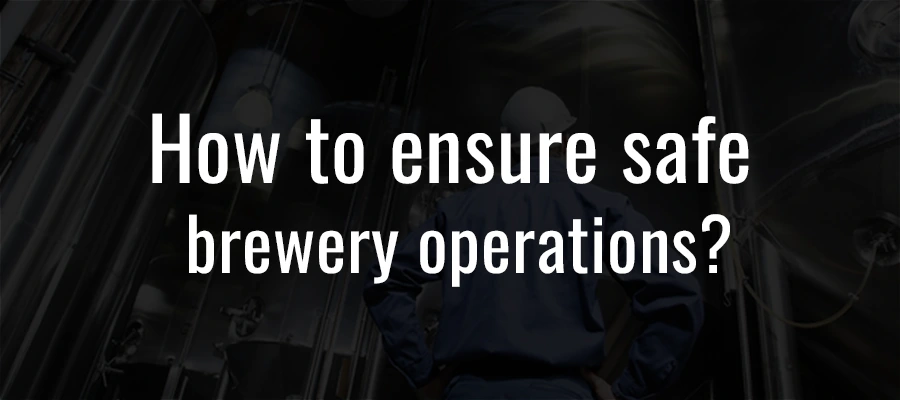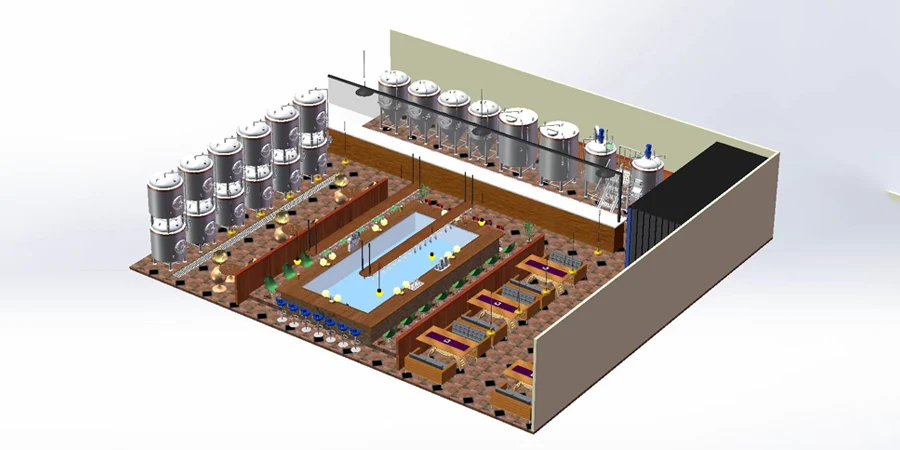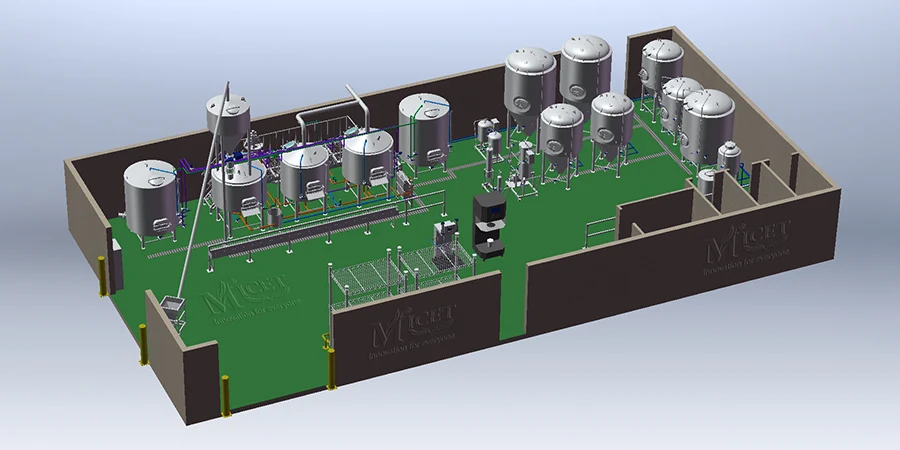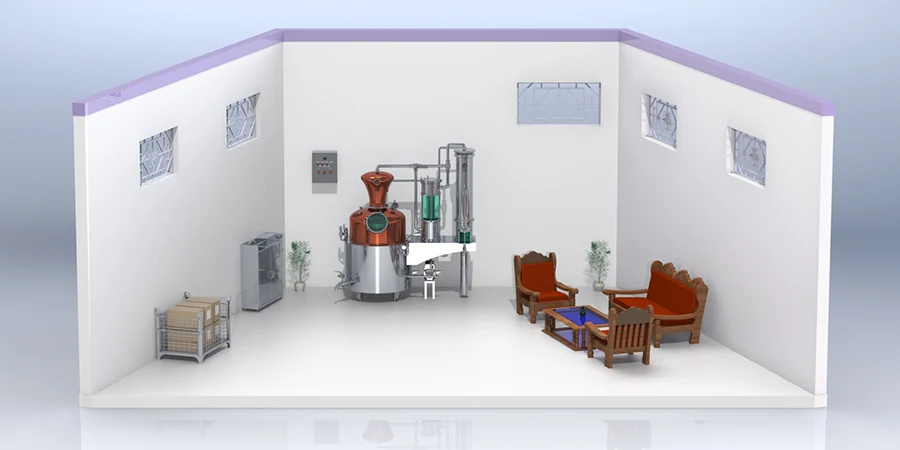Ensuring safe brewery operations is paramount. The craft brewery industry has undergone a revolution, attracting many to its profitable opportunities around the world. However, it is important to remember that safety should not be compromised for the sake of maximizing profits. In fact, it is also one of the energy-saving industries.
Managing risk and prioritizing safety at your brewery can bring significant financial benefits. These include reducing the quantity, severity, and financial impact of injuries, lowering insurance and workers’ compensation costs, minimizing equipment downtime, preventing product loss, enhancing brand equity, optimizing work procedures, and promoting business sustainability. As a brewery owner, how can you ensure the safety of your operations and prevent potential hazards? Below, we outline common safety implications and recommended handling practices for breweries:
Working in confined spaces
Brewery factories often have confined spaces and narrow entries that can be hazardous for workers. These areas are typically characterized by high temperatures and a gaseous environment with a deficiency of oxygen. In addition, mechanical agitators used in these spaces generate intense heat, making it difficult for workers to even stand near them. This combination of factors increases the risk of suffocation or burns. Therefore, it is crucial for brewery factory owners to implement safety measures and provide proper training to workers before assigning them to work in confined spaces. This will ensure a safe working environment and prevent accidents or injuries.
Inert gas
In the brewing industry, carbon dioxide and nitrogen are commonly used as inert gases, which do not react with other chemicals or compounds. While these gases are essential for producing beverages, they can also be dangerous if not used properly. In poorly ventilated spaces, unprotected CO2 tanks or lines that leak can lead to suffocation and even death. To prevent such incidents, it is important to implement mitigation strategies such as confined space entry procedures, ventilation, leak management, and oxygen depletion monitoring equipment. All personnel must be trained to recognize the risks and follow safety protocols when entering enclosed areas where these gases are present. As a brewery owner, ensuring the safety of your team from the harmful effects of inert gases is paramount for a successful and sustainable operation.
Cleaning chemicals
Using conventional cleaning chemicals such as solvents and detergents in the food industry poses high risks due to their corrosiveness, toxicity, and flammability. Proper handling and protective equipment are necessary to prevent harm to both humans and animals. Additionally, these chemicals require adequate waste disposal systems as they generate large volumes of waste streams within small areas. The use of cleaners containing hazardous substances not only poses practical problems but can also have adverse effects on personnel health and safety.
To minimize risks associated with cleaning chemicals, it is important to provide personal protective equipment where necessary, as well as safety showers and eye-washes in case of spills. All cleaners should be stored under lock and key in designated points, and their sale or use should only be authorized by a warehouse manager. As a responsible business owner in the food industry, taking appropriate safety precautions when handling cleaning chemicals is essential for protecting your team and ensuring safe operations.
Powders
In brewery operations, diatomaceous earth (DE) filter powder and other fine powders are commonly used. However, these powders can pose serious health risks, such as respiratory irritation and carcinogenic effects. To prevent harm to your team, it is crucial to implement good dust control practices and preferably use dedicated powder handling systems with integral dust control.
When handling powders, wearing dust masks is essential to minimize exposure. Additionally, proper ventilation and dust control equipment should be in place to prevent the release of harmful particles into the air. By taking these precautions, you can ensure the safety and well-being of your team while working with powders in your brewery.
As a responsible brewery owner, it is important to prioritize the health and safety of your team. By implementing appropriate safety measures, you can minimize the risks associated with handling powders and ensure safe operations in your brewery.
Dust explosions
Dust explosions are a serious hazard in malt handling, so it’s important to take precautions to prevent them. Proper dust control practices and equipment, such as explosion-proof devices and grounding wires, can help reduce the risk. It’s also essential to train workers on safe handling and disposal of malt dust and provide appropriate personal protective equipment. By prioritizing safety, you can protect your team and create a safer workplace.
Water and electricity
Water and electricity are both necessary in breweries, but they can also be a dangerous combination. Mixing the two can be fatal, so it’s important to take steps to ensure safety. One minimum standard is to have all electrical systems built to a waterproof standard. Domestic style electrical fittings should not be used in breweries. By following these precautions, you can help prevent accidents and create a safer workplace for everyone.
Suck into the tank
Beer tanks are designed to handle pressure, but they can collapse under the wrong conditions. This often occurs when there is an imbalance between internal and external pressures, causing the tank to collapse. To prevent this, Pressure and Vacuum Relief Valves (PVRV) should be installed on the tanks. Additionally, proper usage flow, automation design, and training can also help prevent tank collapse.
Other:
Strains and sprains
Working in a brewery can be physically demanding and potentially dangerous. Two common hazards are strains and sprains from heavy lifting and slips and falls on wet surfaces. To mitigate these risks, breweries should provide employees with proper lifting and moving tools and training on good ergonomics. It’s also important to ensure walking surfaces are clean and dry, and to minimize tripping hazards by properly securing hoses. By prioritizing employee safety and providing the necessary tools and training, breweries can reduce the risk of injuries and create a safer work environment.
Preventing Falls from Heights in Breweries
Breweries often have large vats and kettles that require employees to climb ladders or work on elevated surfaces to add ingredients and monitor the brewing process. However, falls from heights can result in serious injuries or even fatalities. To prevent falls, it is essential to provide proper safety equipment, such as guardrails, safety harnesses, and non-slip surfaces on elevated platforms. In addition, regular training on ladder safety, fall prevention, and proper use of safety equipment should be provided to all employees who work at elevated heights.
Burns
Brewing is a process that involves handling hot liquids and welding, which can result in burns and other injuries. Even with jacketed tanks, there is still a risk of leaning against an uninsulated holding tank or spilling hot liquids. Additionally, welding fermentation tanks can lead to injuries and even death.
There are many hazards in a brewery, and it is important to have knowledge and understanding of potential hazards. Engineering and procedural steps should be in place to manage hazards, and regular hazard audits should be conducted on new equipment. Training on hazard management and safe working procedures is also crucial.
Hazard management is complex, and it is recommended that those starting a brewery seek help from a brewery-experienced Health and Safety expert to ensure the safety of employees.







